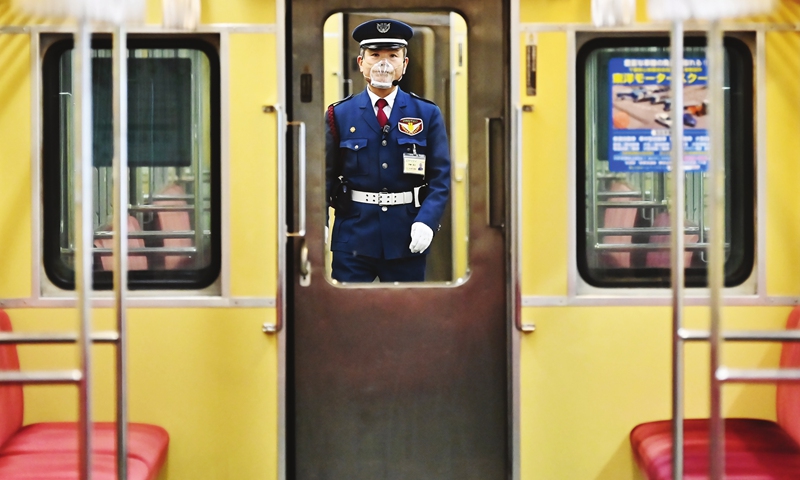China, Japan to launch ‘fast track’ to facilitate cross-border visits
Source: Global Times Published: 2020/11/25 19:33:40

A staff member wearing a face mask, amid concerns of coronavirus, checks train cars at the terminal station of the Asakusa Line in Tokyo, Japan on Tuesday. Japan's bullet train services cut due to few passengers but standard trains roll on, media reports. Photo: AFP
Hopes are rising for Japan to become an early adopter of the China-proposed digital health-code mutual recognition mechanism, after a "fast track" for necessary personnel flows between the two countries was announced on Wednesday, which is to be officially up and running at the end of this month.
The Chinese and Japanese governments reached consensus on setting up a "fast track" to facilitate flows of people including commercial exchanges on the basis of strict virus prevention and containment, Foreign Ministry spokesperson Zhao Lilian said on Wednesday.
The consensus was confirmed by the two nations' foreign ministers on Tuesday.
Visiting Chinese State Councilor and Foreign Minister Wang Yi and Japanese Foreign Minister Toshimitsu Motegi agreed on Tuesday to ramp up cooperation and communication amid the coronavirus pandemic. They agreed to roll out of a fast track for necessary personnel exchanges within this month to push for the resumption of work and production cooperation.
Hailing the move as an active response to foster bilateral flows of people, Zhao announced that the two countries agreed to officially launch the fast track on November 30.
Businesspeople likely to resume travel would be employees taking short business trips and those having been assigned to work overseas. They will have to submit certifications including negative nucleic acid test results, the Nikkei reported.
The Japanese Embassy in China on Wednesday didn't give a definite answer to the Global Times' inquiry about efforts on the side of Japan to ensure the smooth launch of the fast track.
Some Japanese companies and commercial institutions operating in China told the Global Times that it's unclear at this point whether they qualify for commercial exchanges as described in the fast track. They said they had not received any relevant information from the Japanese Embassy in China or other Japanese institutions.
The imminent availability of the "fast track" ignited hopes of the digital health-code's mutual recognition mechanism by more countries in the coming days and weeks, experts said.
The creation of an international mechanism for digital health-code mutual recognition was proposed by China at the 15th G20 Leaders' Summit earlier this month.The mechanism is envisioned to be based on nucleic acid test results and use of universally recognized QR codes.
The forthcoming fast track between China and Japan could be a prelude to the trial of a mutually recognized health code system in the two countries, Qi Qi, an aviation market watcher, told the Global Times on Wednesday.
In a fresh sign of the wider use of the digital health-code, the Chinese Embassy in France issued a notice on its website on Wednesday, requesting both Chinese and foreign passengers boarding flights from France to China to file for health codes, effective December 1.
The passengers need to apply for green health codes marked as HS or HDC, based on certifications of negative coronavirus nucleic acid test results and negative IgM results sampled in France within two days prior to boarding their flights, read the notice.
There are no technical barriers for health codes to be mutually recognized, which could mean a connection of health code generation applications running in different parts of the world by integrating application programming interfaces, observers said, adding lack of mutual trust concerning data security and user privacy could be a roadblock.
It could be the case that China's health codes will be easily recognized by other countries, factoring in the nation's effective virus containment, while it could be an issue for the health code approach to prevail and genuinely play its part in containing the disease in other countries, Liu Dingding, a Beijing-based independent analyst, told the Global Times on Wednesday.
Regarding the proposed mechanism could act as a savior to the COVID-19-hit global aviation market, Qi said a tri-partite fast track among China, Japan and South Korea could be in the pipeline.
A fast track has been in place between China and South Korea. Launched on May 1, the fast track for businesspeople travelling between the two nations had expedited nearly 10,000 visits from both countries, Xinhua reported in September.
The availability of more fast tracks that ease travel restrictions on certain categories of people would be more readily applicable, Liu believed, pinning hope on COVID-19 vaccines to eventually clear the roadblocks for travel.
Posted in: ECONOMY,BIZ FOCUS